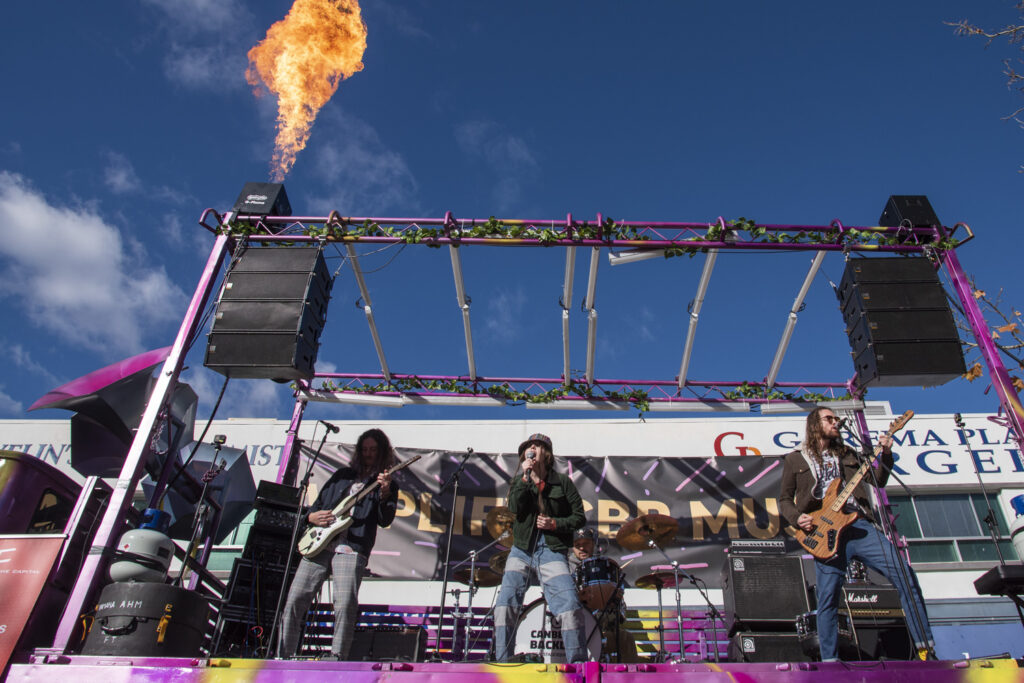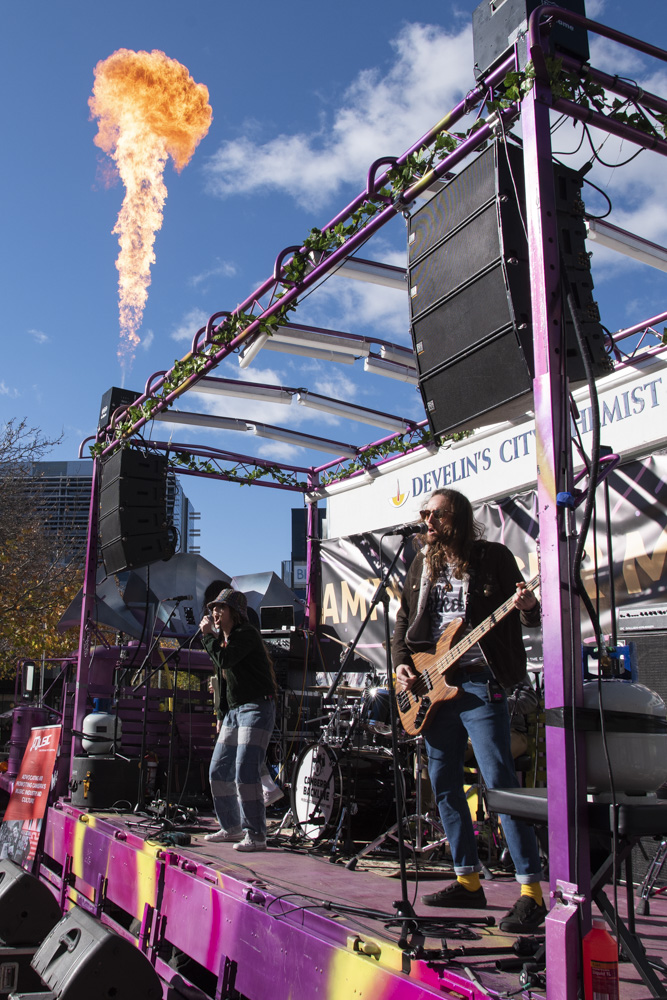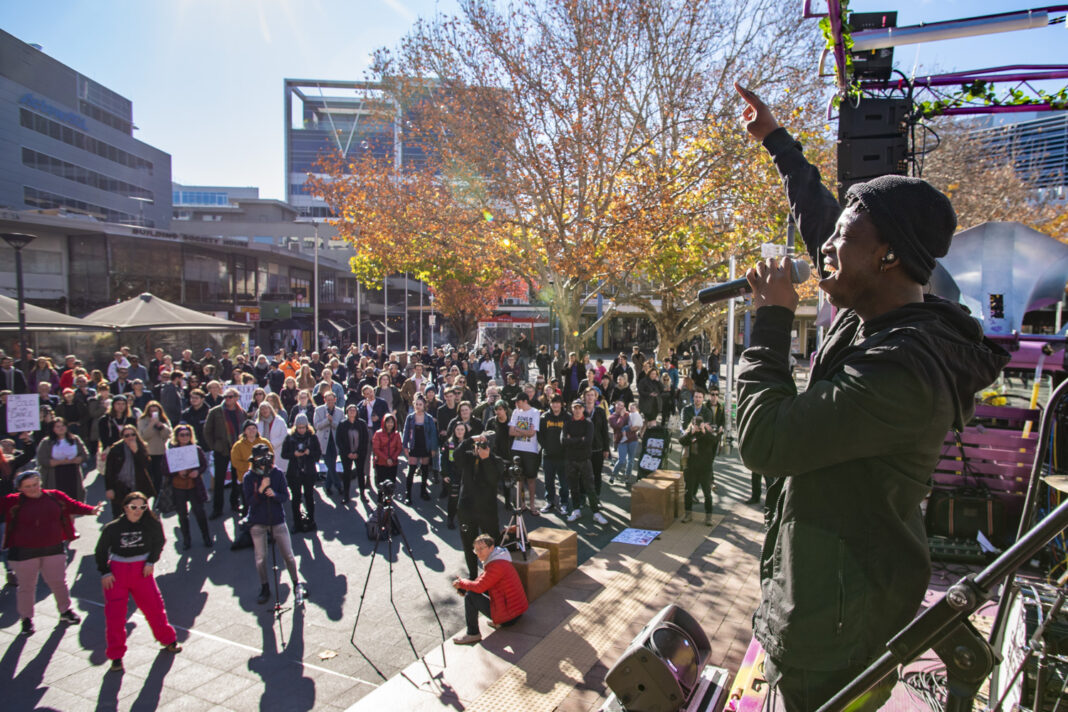It’s a protest concert that has brought the matter of protecting live music and Canberra’s antiquated sound laws back into the hearts, minds and ears of the public.
Peak body Music ACT’s free event, called Let Music Live, was held at lunchtime on Friday 21 June in Garema Place, as they continue to seek to protect and grow Canberra’s live music scene while minimising disruption.
Organised in the space of a week, around 800 to 1,000 people turned out for the gig that saw swathes of high profile Canberra musicians, like SAFIA and Citizen Kay, take to the stage.
Music ACT President David Caffrey told Canberra Daily the organisation is sick of inaction on sound laws in Canberra.

“We need entertainment precincts, we’ve known that for a long time, the government have known that for a long time.
“As soon as you put in noise-sensitive buildings, such as a hotel in to Garema Place, it will mean the closure or a serious dampening of these venues.
“There is evidence and references for policy all over the country; we are one of the last cities in the country to be acting on the protection of live music,” Caffrey said.
Currently, the ACT’s sound laws say that in town centres like Civic, from 7am to 10pm (8am-10pm Sundays and public holidays) the sound limit is 60dB, the equivalent of a vacuum cleaner; while from 10pm to 7am (10pm-8am Sundays and public holidays) the sound limit is 50dB, the equivalent of a washing machine.
For comparison’ sake, daytime sound levels in quiet residential areas are 35-45dB.
The ACT’s current system is response-based, meaning action is only taken once a complaint has been lodged formally through Access Canberra.
Music ACT has presented a one-page document to the government outlining how they suggest the music and sound laws could be updated.
“We’re simply saying we can have a coexistence of hotels, apartments and music venues. It’s not hard, it’s been done, let’s do it,” Caffrey said.
ACT Minister for Planning and Land Management, Mick Gentleman, said the government is working to support the local music scene while balancing the preferences of local residents.
“We are looking at measures to support the existing night-time economy, such as extending daytime noise limits later into the evening in our town centres on Friday and Saturday nights,” he said.
“We are also pursuing reforms of strata laws to better manage mixed-use precincts to meet the needs of everyone concerned.
“We will soon request the National Capital Design Review Panel considers acoustics, as well as aesthetic aspects, when it reviews mixed-use development proposals.”
Minister Gentleman met with MusicACT the day before Let Music Live to discuss their concerns.

ACT Opposition Leader Alistair Coe said the government should encourage economic development through sound planning and timely decision making.
“At the moment, the lack of certainty in the planning system and out-of-date noise rules creates uncertainty and a lack of confidence, especially in the hospitality and entertainment industry.
“The government needs to value and respect long-standing businesses that have contributed to our city for years. We also need clear guidelines that support and encourage new businesses.”
Geocon Managing Director Nick Georgalis said he’s found it frustrating to see reports associating the discussion around sound laws with his company’s City Hotel development.
“It’s not Geocon’s responsibility to manage noise restrictions and it’s not our fault if they are currently being abused,” he said.
“It’s up to the ACT Government to bring in sensible measures, to let private businesses keep bringing Canberra up to its undeniable potential.”
Georgalis said there are already a number of existing hotels in the city in close proximity to night venues, such as: The Crowne Plaza is located less than 100m from Canberra Casino; Avenue Hotel Canberra is located less than 300m from Hopscotch; Canberra City YHA is located in the same building as Transit Bar; and Novotel Canberra is located 100m from Mooseheads.
More stories:



